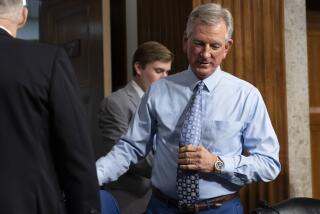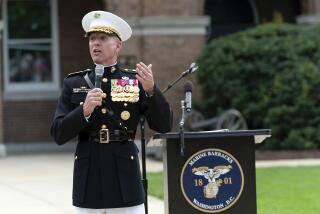Top general in Mideast to retire
WASHINGTON — Army Gen. John P. Abizaid, commander of U.S. forces in the Middle East, has submitted plans to retire and will leave his post in March, a step likely to make way for a change in military strategy at a time the Bush administration is seeking a new plan for Iraq.
Abizaid has been the primary architect of U.S. military strategy in Iraq and Afghanistan since becoming head of the U.S. Central Command more than three years ago. He has strenuously resisted calls to increase troop levels to quell rising violence in Baghdad, arguing it would increase Iraqi dependence on Americans.
But a growing number of current and former officers have embraced the idea, some of whom have briefed President Bush as part of his monthlong review of Iraq policy, and the White House is believed to be considering the move.
“If you’re going to change the strategy, in fairness to [Abizaid], let him go,” said a former senior Pentagon official who has worked closely with the general. “He’s given it all he’s got, in terms of personal sacrifice.”
Abizaid’s planned departure clears the way for new Defense Secretary Robert M. Gates to recommend his own commander, a decision current and former Defense officials say is nearly as important as the new administration strategy expected to be unveiled by Bush in January.
These officials said Gates faces a clear choice between generals who have agreed with Abizaid’s push to quickly hand over security responsibilities to Iraqi forces and a small but increasingly influential coterie of officers backing a more aggressive U.S.-led counterinsurgency campaign.
According to Defense officials, Abizaid submitted his retirement documents just over a month ago, shortly before Donald H. Rumsfeld was pushed out as Defense secretary. One recently retired Army general said Abizaid had wanted to retire earlier but that Rumsfeld blocked the move, insisting his war commanders stay in place.
“Going to war isn’t like having a regular job,” said the retired general, who, like the others, spoke on condition of anonymity because Abizaid’s plans had not been made public. “It’s extremely stressful, it’s heavily responsible. I can understand why he’d want to retire.”
Abizaid’s four-year term as chief of the Central Command, or Centcom, was to end in July. But some close to the Army have speculated in recent weeks that his term might be extended to see through implementation of the administration’s new Iraq strategy. However, a Centcom spokesman said that earlier this year, Rumsfeld asked Abizaid to stay only until “early 2007.”
“He does not intend to extend beyond that period,” the spokesman said. “Gen. Abizaid became commander in July 2003 and has served longer in this position than any previous commander.”
In Gates’ search for a successor, the candidate most closely associated with Abizaid’s strategy is Army Gen. George W. Casey Jr., the commander of U.S. forces in Iraq, who is also expected to leave his current assignment early next year. Although Casey was considered the favorite to become the next Army chief of staff under Rumsfeld, Gates could decide to move him to the Central Command for continuity, officials said.
Critics of the current war effort say making Casey either chief of staff or Centcom commander would send the wrong signal -- essentially endorsing a strategy that the president acknowledges has failed.
“It would be a terrible thing,” said one military analyst with close ties to the Pentagon. “He’s the guy who’s losing the war.”
The leading candidate from the counterinsurgency advocates is Army Lt. Gen. David Petraeus, a highly respected military thinker who led the 101st Airborne Division during the Iraq invasion in March 2003.
In his current job as head of the Army’s leading military schools, Petraeus oversaw the rewriting of the Army and Marine counterinsurgency field manual, which was issued last week and argues that while killing insurgents is often important, the most vital task in a counterinsurgency is winning the support of the population.
The manual also argues for moving soldiers out of large bases into smaller outposts among the local population. Such manpower-intensive tactics run counter to those now used by Abizaid and Casey. Currently, troops clear dangerous Baghdad neighborhoods with regularity but, because of their limited numbers, must quickly turn over long-term security responsibilities to unprepared Iraqi units, which frequently results in backsliding.
Army Lt. Gen. Peter Chiarelli, who last week left Iraq as the head of day-to-day military operations, is also closely associated with such tactics, having implemented them when he was commander of the 1st Cavalry Division in Baghdad’s Shiite slums. He is also seen as a top counterinsurgency candidate if Petraeus is chosen for another job in Iraq, such as replacing Casey.
“I do think there are two camps,” said the military analyst. “I think there is a Petraeus camp, and Chiarelli has been in it, and there is definitely an Abizaid-Casey camp.”
Both Chiarelli and Petraeus have gained key backing from the Army’s influential alumni, such as retired Army Gen. Barry McCaffrey, who recently briefed Bush on his views of Iraq policy, and former Army Secretary Thomas White.
“Chiarelli seems to be the voice of broadening the strategy, [that] this is more than just a shoot-’em-up war,” White said in an interview. “If we’re going to redo this thing, and he seems to be the advocate of change, I’d put him in charge.”
Others candidates associated with the counterinsurgency group are Army Lt. Gen. Martin E. Dempsey, another former division commander in Iraq who is in charge of rebuilding the Iraqi military, and Marine Lt. Gen. James N. Mattis, commander of the 1st Marine Expeditionary Force.
Retired Army officers warned, however, that most members of the senior officer corps are more traditionally trained, focused on conventional warfare rather than asymmetric threats faced by U.S. forces in Iraq. The Army’s seniority system will be a strong influence working against Petraeus and Chiarelli, both relatively junior three-star generals.
“A guy like Petraeus is so ferociously creative and brilliant, sometimes that makes the buttoned-down senior military leadership nervous,” said McCaffrey. “Rumsfeld, I think, has been frightened by talented Army generals.”
Under Rumsfeld, several generals seen as more conventionally minded have been given important posts in recent months, including Army Lt. Gen. Raymond T. Odierno, who replaced Chiarelli as the head of day-to-day operations in Iraq last week, and Gen. Dan K. McNeill, recently selected as the new U.S. commander in Afghanistan.
If Gates decides to go with a more conventional leader at Centcom but pass over Casey, contenders could include Army Gen. David D. McKiernan, currently in charge of Army forces in Europe.
“The Army, left to its own devices, has a senior leadership that for 30 years has carefully guarded the Army’s primary mission of maintaining conventional arms proficiency,” said the recently retired Army officer. “That’s Odierno, but that’s also the core Army ethos.”
The importance of the Centcom choice is hard to overstate, current and former officials said. Although current commanders have given lip service to waging a more complex counterinsurgency campaign, mid-level officers complain privately that their success on the battlefield is still judged by conventional measures, such as the number of insurgents killed or captured.
Kalev Sepp, a counterinsurgency expert at the Naval Postgraduate School, said one Army colonel he spoke with during a Pentagon-sponsored fact-finding mission to Iraq last month expressed frustration that the system still had not adapted to the nature of the war.
“On the one hand, they’re told success will come by protecting the population and winning them over,” Sepp said. “But all the metrics that judge how successful they are as brigade commanders are based on killing enemy troops.”
Advocates for changing course have argued that commanders have tried classic counterinsurgency strategies in Iraq just once, in the 2005 offensive in Tall Afar, where sectarian violence was stifled by flooding the northern Iraqi town with U.S. and local forces and dispersing them in small outposts throughout the city.
The commander of the offensive, Army Col. H.R. McMaster, is one of a group of officers advising Marine Gen. Peter Pace, chairman of the Joint Chiefs of Staff, on Iraq strategy.
*
Times staff writer Julian E. Barnes contributed to this report.
More to Read
Sign up for Essential California
The most important California stories and recommendations in your inbox every morning.
You may occasionally receive promotional content from the Los Angeles Times.










